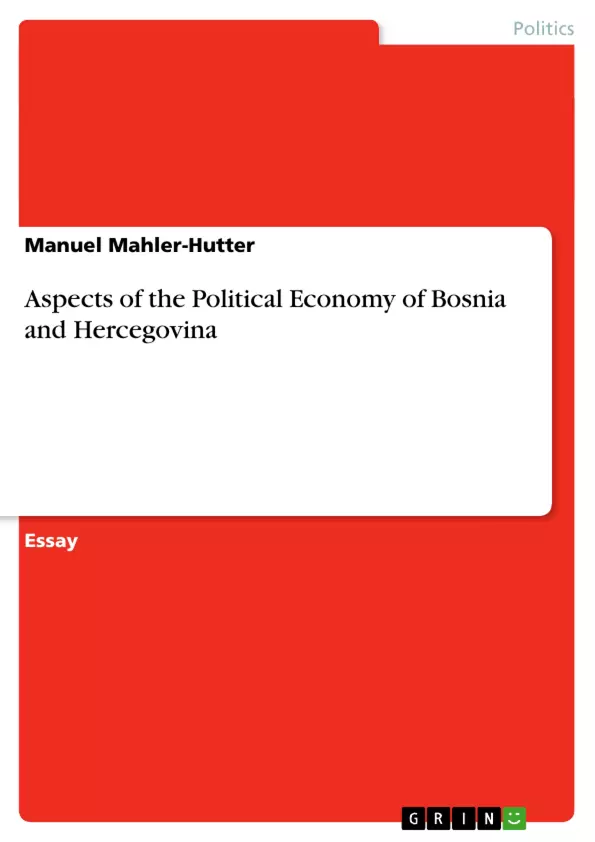Peace, democracy, prosperity, stability and growth are the foundations of
modern, western-styled democracies. These basic principles are the result of
a long, intrinsic process of state-building, democratisation and liberalisation
in the so-called western countries.
When it comes to “exporting” these ideals, when it comes to “westernisation”
of transforming countries, there is a contradiction between the path
and the goal, namely: liberal means with as little of non-market influences
in economic life as possible; democratic means the political order and its actors
are to be chosen by the people of the country. By forcing countries into
westernisation,the bureaus and governing bodies and officials as well as the
noise that surrounds them produce exactly the opposite
Inhaltsverzeichnis (Table of Contents)
- Introduction
- The Political Economy of post-Dayton BiH
- The State and Political Reforms
- Institutions
Zielsetzung und Themenschwerpunkte (Objectives and Key Themes)
The text delves into the political and economic consequences of the international intervention in Bosnia and Herzegovina (BiH) following the Dayton Peace Agreement. The primary objective is to analyze the impact of externally imposed institutions and policies on the country's trajectory toward a liberal democratic state with a market economy. This analysis focuses on the challenges posed by the international community's dominance and the potential for unintended consequences.
- The role of the state in economic reform
- The influence of rent-seeking behavior
- The impact of international aid and bureaucracy
- The challenges of institution-building in a post-conflict environment
- The role of non-governmental organizations (NGOs) in democratic development
Zusammenfassung der Kapitel (Chapter Summaries)
The introduction sets the stage by discussing the inherent contradiction between the goal of Westernization and the methods employed to achieve it, highlighting the potential for unintended consequences arising from external intervention. The paper explores the concept of state failure and its implications for international intervention, referencing relevant literature.
The chapter on the political economy of post-Dayton BiH examines the role of the state in economic reform and the challenges posed by rent-seeking behavior. The author analyzes the sources of rents in BiH, including international aid and the black market, and their impact on economic activity. The chapter also discusses the complex governmental system and its potential to create rents through unclear rules and responsibilities.
The section on institutions examines the limitations of externally imposed institutions, arguing that they often lack the strength and legitimacy of those formulated by the people. The author critiques the role of the High Representative and the EU's intervention in Bosnia, raising concerns about their impact on democratic development and the rule of law. The chapter also analyzes the role of NGOs in the context of international intervention, discussing the potential for foreign funding to influence their objectives and undermine their intended role in promoting democratic values.
Schlüsselwörter (Keywords)
The text explores key concepts such as state failure, international intervention, economic reform, rent-seeking, institution-building, post-conflict reconstruction, democratic development, and the role of non-governmental organizations (NGOs). These concepts are examined within the specific context of Bosnia and Herzegovina (BiH) following the Dayton Peace Agreement.
- Arbeit zitieren
- Manuel Mahler-Hutter (Autor:in), 2010, Aspects of the Political Economy of Bosnia and Hercegovina, München, GRIN Verlag, https://www.hausarbeiten.de/document/194490


